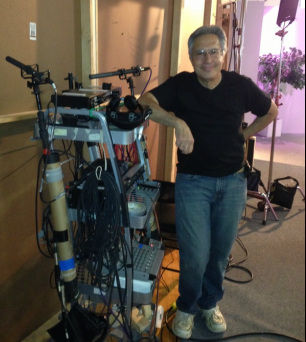 Coleman Clarke on the set of "Star Trek: Phase II."
Coleman Clarke on the set of "Star Trek: Phase II." Take Coleman Clarke, who has managed sound duties with aplomb at the recent filming of Star Trek: Phase II for an episode that I wrote titled “The Holiest Thing.” A Syracuse University alum, Clarke’s radio and television news career stretches back to the Mutual Broadcasting System, more than 30 years as a broadcast engineer with NBC, and a stint as a higher-ed instructor.
Clarke has covered presidents, tragedies and political gaffes. He rubbed elbows with the likes of David Brinkley, John Chancellor and Tom Brokaw. He was there when President Reagan was shot, and he was deeply involved in the coverage of 9/11.
As an old news guy myself, I spoke with Clarke about how journalism has changed in recent decades. He had some great insights and strong opinions on the topic.
“When I started, when there was a story to pursue, a lot of effort was put into gathering of details and confirming veracity of sources before a story was either published or broadcast,” Clarke said. “Because you have virtually unlimited sources of news now, be they podcasts and blogs, Internet TV as well as the more well-supported facilities, I think there is a zeal to make yourself known either by breaking a story, breaking aspects of that story or proving the story wrong.”
That pressure, Clarke explained, has shifted the focus of news reporting from getting it right to getting it now.
“A lot of the stories we see on the Internet are snake oil,” he lamented. “We are a disposable society, and we are so adamant for immediate gratification, we like to have our facts in quotes now, on our schedule, on our time.”
Clarke cited Brinkley and Chancellor as journalists who would go with a story only after they were personally convinced the news was sound. Now, he said, “I have seen the deterioration of journalistic research and a rush to judgment that has been exacerbated by the proliferation of non-credentialed journalists.”
Interestingly, Clarke said the responsibility for resurrecting journalism’s higher standards of the past lies not just with the agencies themselves, but with the consumers of news. People need to be more discerning of what they hear or read, and they shouldn’t rely on just one source of news, he said—especially when individual news organizations may be prone to a politically left or politically right approach to reporting.
Getting people more engaged in understanding the news might be a tough sell. When teaching university courses, Clarke discovered students who got all of their news from Jon Stewart. Others couldn’t name a president prior to Bill Clinton, didn’t know who Richard Nixon was and had never heard of Watergate.
“We are not educating our students,” he said. “That is part of the reason why they are susceptible to getting news from unreliable sources. They don’t have the tools to discern what is right and what is wrong.”
Clarke earned an avid fan in me. While the online world has opened many new avenues for people to gather news and information, it’s critically important for journalists to adhere to the age-old virtues of accuracy, veracity and meaningful perspective, and for the rest of us to discern what’s real rather than wait to be spoon-fed.

 RSS Feed
RSS Feed
